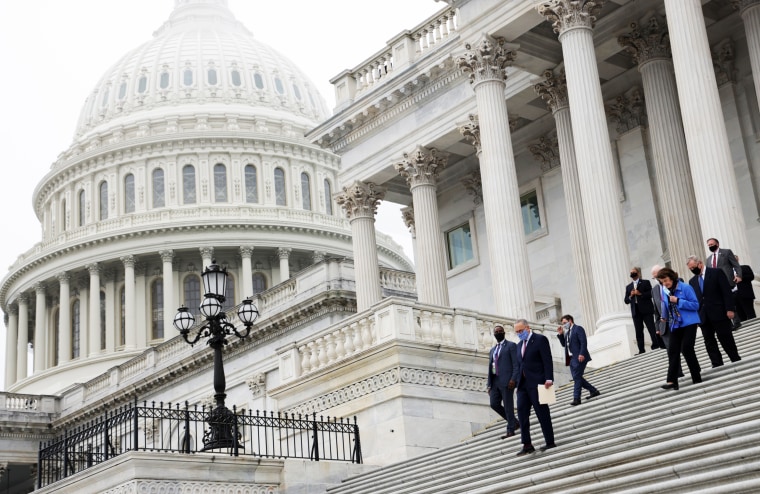The new economic relief package approved by federal policymakers includes $600 direct-aid checks, which is $600 more than congressional Republicans initially wanted. Nevertheless, Donald Trump now wants $2,000 checks -- the president has described the $600 payments as a "disgrace" and "ridiculous" -- a demand he made only after the bipartisan agreement was negotiated and passed.
Congressional Democrats, meanwhile, have not only pushed all along for more generous payments, they're also eager to take advantage of the fact that Trump agrees with them and not with his own GOP allies. With this in mind, the Democratic-led House yesterday afternoon did exactly what the president asked the chamber to do.
The Democratic-controlled House narrowly passed a bill Monday evening to increase direct coronavirus relief payments to some people to $2,000, although the measure faces an uphill battle in the Republican-run Senate despite support from President Donald Trump. The legislation would increase the $600 in direct payments to those who earned less than $75,000 last year to $2,000.
Under the procedural rules in place yesterday afternoon, the measure needed a two-thirds majority. The bill -- the "Caring for Americans With Supplemental Help Act" (or CASH Act) -- just barely crossed that threshold, passing 275 to 134.
The roll call, however, makes the partisan divisions clear: while a couple of House Dems broke ranks and opposed the proposal, the Democratic majority overwhelmingly backed the larger aid checks. Among Republicans, however, only 44 members voted to pass the bill, while 130 GOP members voted to kill it.
In other words, Donald Trump demanded Congress approve $2,000 direct-aid payments, and roughly three-quarters of House Republicans -- a conference dominated by far-right members closely aligned with the White House -- decided to ignore the wishes of their own party's president.
During the floor debate, Rep. Kevin Brady (R-Texas), one of the principal architects of the Republicans' regressive tax plan in 2017, argued that the $2,000 checks are a bad idea because Americans would likely use the money to "pay down credit card debt, or make new purchases online at Wal-Mart, Best Buy or Amazon."
Evidently, this didn't prove persuasive. Imagine that.
Regardless, with support from Trump and Democrats, does this proposal have a legitimate shot at passing? The odds are still against it: the bill now heads to the Republican-led Senate, where it will need 60 votes to advance. Even if 48 Democratic votes are in place, they'll need 12 GOP senators to go along with the president's wishes, and at this point, those votes are unlikely to materialize.
The fight will nevertheless be worth watching. Senate Minority Leader Chuck Schumer (D-N.Y.) will reportedly try to pass the bill by unanimous consent today, which will almost certainly draw Republican opposition. In fact, Senate Majority Leader Mitch McConnell (R-Ky.), who hates measures that divide his members, would likely prefer not to even consider the $2,000 direct-aid bill at all.
Some members don't intend to give him much of a choice: Sens. Bernie Sanders (I-Vt.) and Ed Markey (D-Mass.) yesterday announced plans to filibuster the vote on overriding Trump's veto of military spending until after the Senate is able to vote on the direct-aid proposal.
Will Trump invest any real effort into twisting Senate Republicans' arms? Will McConnell allow a vote on the measure his members don't like? Will GOP members ignore their ally in the Oval Office on the final request of his presidency? What will Georgia's Republican incumbents -- Kelly Loeffler and David Perdue -- do in the closing days of their competitive runoff elections? How quickly can these matters be resolved before the current Congress formally ends this weekend?
Nothing like a little Capitol Hill drama to spice up the week between Christmas and New Year's Day.

